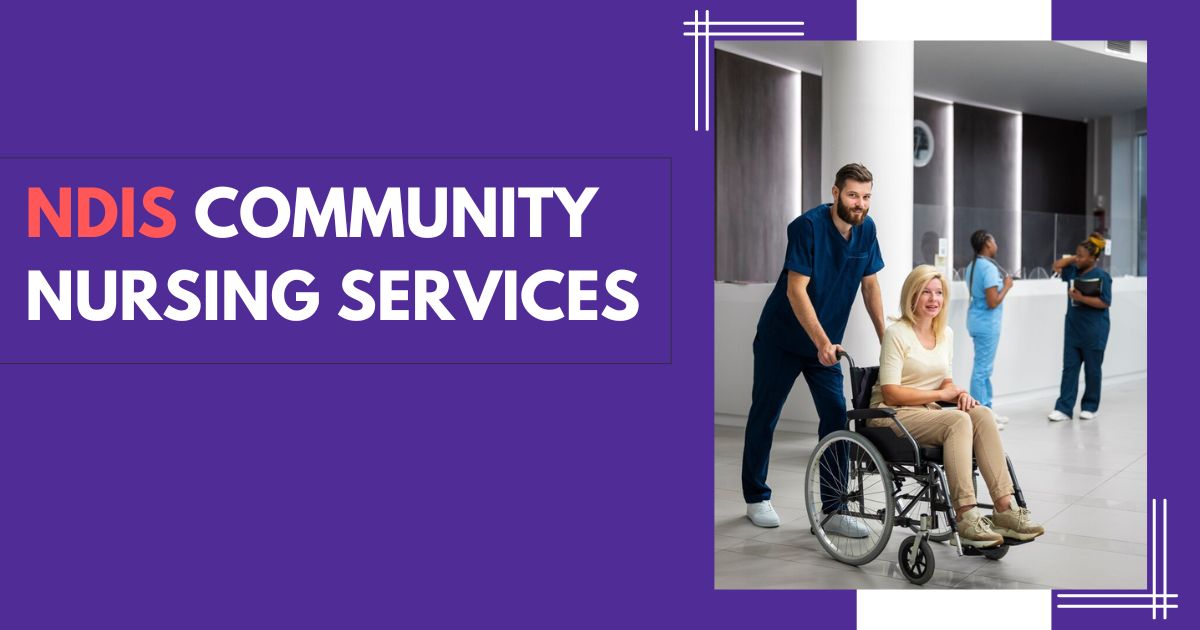The National Disability Insurance Scheme (NDIS) is an essential program in Australia designed to support people with disabilities. This program helps individuals live more independently and ensures they receive the care they need. Among the various services provided by the NDIS, one of the most important is community nursing care. This service allows individuals to receive professional nursing support in the comfort of their homes. It is specifically tailored to meet each person’s unique healthcare needs, ultimately improving their overall well-being and quality of life.
What Are NDIS Community Nursing Services?
NDIS community nursing services offer healthcare that comes to you at home or in your community. This helps people manage their health without having to go to the hospital all the time. These services are especially helpful for those who have complicated health problems, long-term illnesses, or disabilities that need regular care.
Community nurses are trained healthcare workers who can help with many different health needs. They work closely with the people they care for, their families, and other doctors or nurses to make sure everyone’s medical needs are met. They can do things like take care of wounds, give medicines, help manage chronic illnesses, and teach people about health. From taking care of wounds and giving medications to managing chronic conditions and providing health education, NDIS community nursing services are customised to fit each person’s unique needs.
Key Services Offered by NDIS Community Nurses
Community nurses are qualified healthcare professionals who are trained to address a wide range of health issues. They work closely with participants, their families, and other healthcare providers to ensure that all medical needs are met. Their responsibilities can include:
- Wound Care: Community nurses provide care for wounds, whether they are chronic (long-term) or acute (recent). They help prevent infections and promote healing, which is especially important for those who may have limited mobility or are recovering from surgery.
- Medication Management: Managing medications can be confusing and overwhelming, especially for individuals taking multiple prescriptions. Community nurses assist with medication administration, making sure that participants take the right medication at the right time. They also educate participants about their medication plans and monitor for any side effects.
- Chronic Disease Management: Many participants live with chronic conditions, such as diabetes, heart disease, or respiratory issues. Community nurses play a crucial role in helping manage these conditions. They provide regular monitoring, lifestyle advice, and preventive care, which can help participants maintain their health and lower the risk of complications.
- Catheter and Stoma Care: For individuals who need catheter or stoma management, community nurses provide specialised care. This includes routine changes, cleaning, and monitoring for any potential complications.
- Palliative Care: Community nurses offer palliative care for those with serious illnesses. The focus of this care is to ensure comfort and improve the quality of life for participants. This includes pain management, emotional support, and guidance for both participants and their families.
- Health Education and Support: A key part of community nursing is empowering participants with knowledge. Nurses provide education on managing health conditions, living healthier lifestyles, and recognising early signs of complications. This support helps participants take charge of their health and promotes self-care.
- Continence Management: Continence issues can be challenging for many individuals with disabilities. Community nurses offer assessments and create personalised continence management plans to improve comfort and dignity.
The Benefits of NDIS Community Nursing Services
NDIS community nursing services provide numerous benefits to participants, improving both health outcomes and overall well-being. Here are some of the key advantages:
- Personalised Care: Community nurses work closely with participants, ensuring that care is tailored to their specific needs. This individual attention allows for better support than what is typically available in hospitals.
- Convenience and Comfort: Receiving nursing care at home allows participants to stay in a familiar environment, reducing stress and anxiety. This is especially helpful for individuals who may have difficulty travelling to healthcare facilities.
- Improved Health Outcomes: Regular visits from community nurses help participants manage their health conditions more effectively. This leads to fewer hospital admissions and better long-term health outcomes. Nurses can monitor symptoms, manage treatments, and provide preventive care, all of which contribute to maintaining participants’ health.
- Empowerment and Independence: These services aim to empower participants to take control of their health. By providing education and support, nurses help individuals manage their conditions more independently. This can improve their confidence and ability to care for themselves.
- Support for Families and Caregivers: Community nursing services benefit not only the participants but also their families and caregivers. Nurses provide guidance on how to care for their loved ones at home, reducing the burden on family members and helping them feel more confident in their roles.
Eligibility for NDIS Community Nursing Services
To access community nursing services through the NDIS, participants need to have nursing care included in their NDIS plan. This is determined during a planning meeting, where individuals discuss their healthcare needs with an NDIS planner. If nursing care is required, it can be added as part of the participant’s support package.
Conclusion
NDIS community nursing services play a vital role in delivering high-quality healthcare to individuals with disabilities. These services provide participants with the opportunity to receive personalised care at home, which can greatly enhance their quality of life. Whether it’s managing chronic conditions, providing wound care, or offering palliative support, community nurses are essential in helping participants live healthier, more independent lives. By ensuring that participants’ health needs are met, these services promote well-being and empower individuals to thrive in their communities.






Comments